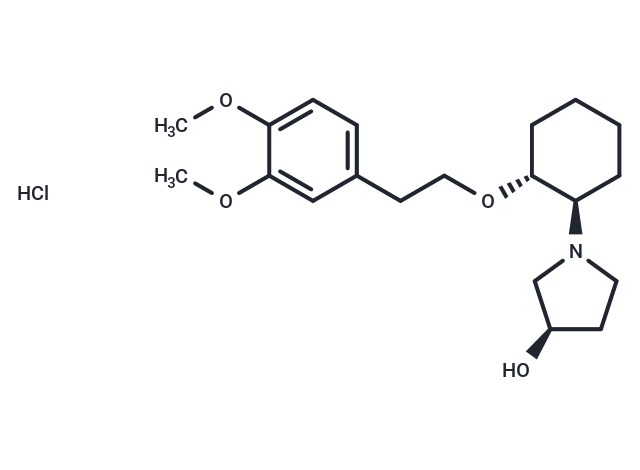
Vernakalant Hydrochloride
CAS No. 748810-28-8
Vernakalant Hydrochloride( —— )
Catalog No. M33529 CAS No. 748810-28-8
Vernakalant Hydrochloride (RSD1235 hydrochloride) is a mixed voltage- and frequency-dependent Na+ and atria-preferred K+ channel blocker.
Purity : >98% (HPLC)
 COA
COA
 Datasheet
Datasheet
 HNMR
HNMR
 HPLC
HPLC
 MSDS
MSDS
 Handing Instructions
Handing Instructions
| Size | Price / USD | Stock | Quantity |
| 2MG | 103 | Get Quote |


|
| 5MG | 169 | Get Quote |


|
| 10MG | 275 | Get Quote |


|
| 25MG | 507 | Get Quote |


|
| 50MG | 730 | Get Quote |


|
| 100MG | 981 | Get Quote |


|
| 500MG | Get Quote | Get Quote |


|
| 1G | Get Quote | Get Quote |


|
Biological Information
-
Product NameVernakalant Hydrochloride
-
NoteResearch use only, not for human use.
-
Brief DescriptionVernakalant Hydrochloride (RSD1235 hydrochloride) is a mixed voltage- and frequency-dependent Na+ and atria-preferred K+ channel blocker.
-
DescriptionVernakalant hydrochloride is a mixed voltage- and frequency-dependent Na+ and atria-preferred K+ channel blocker. IC50 for block by Vernakalant of wild-type and mutant Kv1.5 channels Fractional block is 13.35±0.93 μM, 0.61±0.03 μM, and 1.63±0.09 μM for Kv1.5 channelwt, Kv1.5 channelI508F, Kv1.5 channelT479A, respectively.
-
In VitroBlock of Kv1.5 by Vernakalant Hydrochloride is mediated after channel activation, because Vernakalant causes a relatively rapid onset of block of channel current upon depolarization but little evidence of resting or “tonic” block of the channel. In the presence of 10 μM Vernakalant, rapid block is apparent after channel opening, and a steady-state current level is rapidly reached. The most important effect is the reduction in potency for Vernakalant centered at I502A, which had an IC50 of 329±19 μM (n=4-10), compared with a control IC50 of 13.4±0.9 μM (n=5-23), which is a 25-fold decrease in potency. V505A, I508A, T480A, and C500A showed lesser reductions in potency on Kv1.5, of between 3- and 4-fold. I508Y in our experiments increased the IC50 for Vernakalant on Kv1.5 to 24.7 μM, again similar to the reported value for hERG.
-
In Vivo——
-
Synonyms——
-
PathwayMembrane Transporter/Ion Channel
-
TargetSodium Channel
-
RecptorSodium Channel | Potassium Channel
-
Research Area——
-
Indication——
Chemical Information
-
CAS Number748810-28-8
-
Formula Weight385.93
-
Molecular FormulaC20H32ClNO4
-
Purity>98% (HPLC)
-
SolubilityIn Vitro:?DMSO : 50 mg/mL (129.56 mM; Ultrasonic ) H2O : 50 mg/mL (129.56 mM; Ultrasonic)
-
SMILESCl.COc1ccc(CCO[C@@H]2CCCC[C@H]2N2CC[C@@H](O)C2)cc1OC
-
Chemical Name——
Shipping & Storage Information
-
Storage(-20℃)
-
ShippingWith Ice Pack
-
Stability≥ 2 years
Reference
1. Eldstrom J, et al. The molecular basis of high-affinity binding of the antiarrhythmic compound Vernakalant (RSD1235) to Kv1.5 channels. Mol Pharmacol. 2007 Dec;72(6):1522-34.?
molnova catalog



related products
-
Levobupivacaine
Levobupivacaine is an amino-amide local anaesthetic drug belonging to the family of n-alkylsubstituted pipecoloxylidide.
-
Benzonatate
Benzonatate is an antagonist of sodium channel protein.Na(+) currents are inhibited most potently by a benzonatate fraction containing the 9-ethoxy component.?
-
Carbamazepine
Carbamazepine, a?sodium channel?blocker, is an anticonvulsant drug.



 Cart
Cart
 sales@molnova.com
sales@molnova.com


